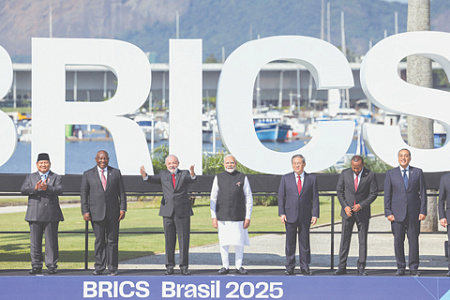
The BRICS summit has commenced in Rio de Janeiro, bringing together a newly expanded group of nations aiming to challenge the Western-led global order. However, the bloc’s ambition to forge a united front is being severely tested by deep internal divisions, external pressures from the United States, and the notable absence of key leaders from China and Russia, casting a shadow over the proceedings.
The group, which has grown to include nations like Egypt, Iran, the UAE, and Ethiopia alongside its original core, now represents a significant portion of the global economy. In a video address, Russian President Vladimir Putin highlighted that BRICS’s collective GDP has surpassed that of the G7 in purchasing power parity, arguing that the Western model of globalization is obsolete. A central, and contentious, goal remains the push for de-dollarization in trade, a move that has drawn threats of sanctions from Washington.
Despite this ambitious agenda, host nation Brazil is navigating a delicate diplomatic path. President Luiz Inácio Lula da Silva is reportedly attempting to steer discussions away from direct condemnations of the U.S. and Israel, focusing instead on less politically charged topics like artificial intelligence and climate change. This cautious approach is seen as an effort to avoid antagonizing the White House, highlighting the fine line member states must walk.
The absence of Chinese President Xi Jinping and Russian President Vladimir Putin has further complicated the summit’s dynamics. Xi’s decision to send Premier Li Qiang is interpreted by some as a strategic downgrading in response to Brazil’s less confrontational tone. Putin’s absence is officially linked to the host country’s obligations to the International Criminal Court, which has issued an arrest warrant for the Russian leader.
Analysts predict that these factors will lead to a diluted outcome. The summit’s final declarations on major geopolitical crises, such as the conflicts in Ukraine and the Middle East, are expected to be intentionally vague and non-committal. According to experts, the absence of the group’s most powerful and anti-Western voices makes it easier for Brazil to guide the summit toward more technical and less controversial conclusions.
Perhaps the most significant obstacle to the bloc’s coherence is the entrenched rivalry between its two most populous members, China and India. Recent accusations from New Delhi that Beijing has provided military support to Pakistan have exacerbated long-standing border disputes and mistrust. This fundamental conflict between two of its giants continues to undermine the very foundation of BRICS, leaving its potential as a unified alternative force on the world stage in serious question.
